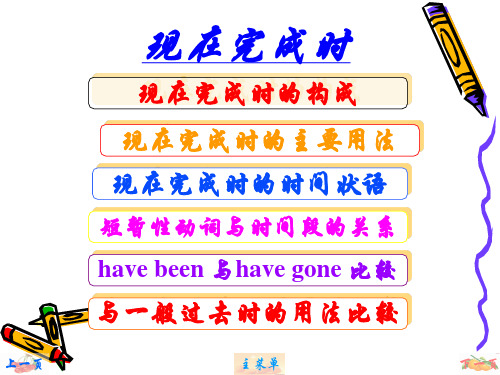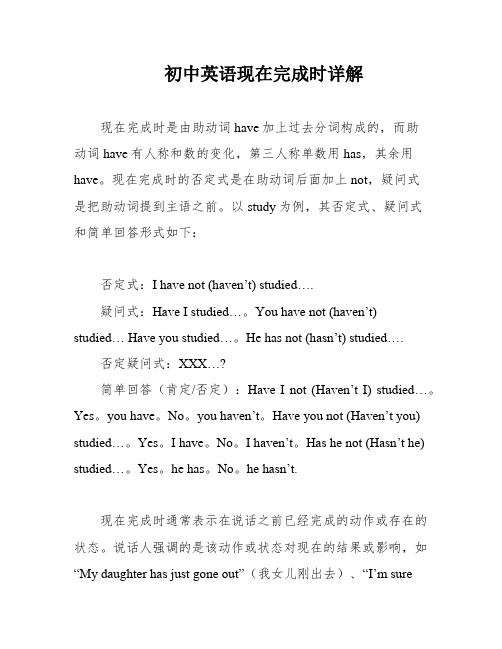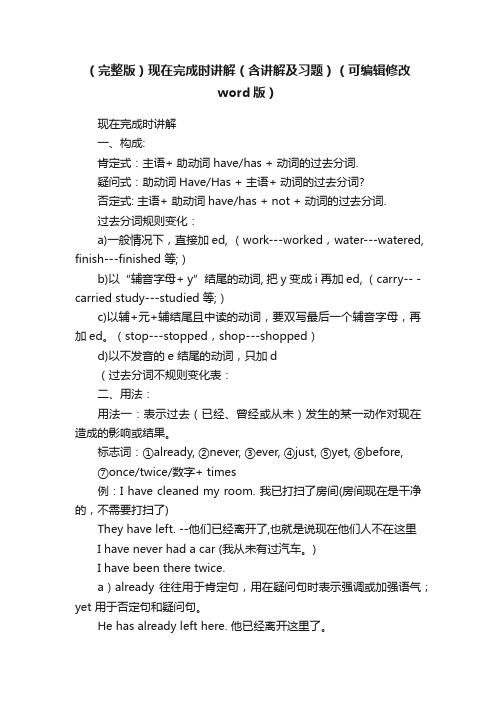(完整)初中英语现在完成时详解
(完整)初中英语现在完成时详解.doc

在完成一、在完成构成构成:在完成由助have + 去分构成,助have 有人称和数的化。
第三人称数用has,其余用have.在完成的否定式直接在助后面加上not、疑式是把助提到主之前。
以study 例,其否定式、疑式和回答形式如下:否定式疑式I have not (haven ’ t) studied ⋯. Have I studied ⋯?You have not (haven ’ t) studied ⋯. Have you studied ⋯?He has not (hasn ’ t) studied ⋯. Has he studied ⋯?否定疑式回答(肯定 /否定)Have I not (Haven ’ t I) studied ⋯? Yes, you have. No, you haven ’ t.Have you not (Haven ’ t you) studied ⋯?Yes, I have. No, I haven ’ t.Has he not (Hasn ’ t he) studied ⋯? Yes, he has. No, he hasn’ t.二、在完成用法1、在完成通常表示在之前已完成的作或存在的状。
人的是作或状在的果或影响。
My daughter has just gone out.我女儿出去。
I ’ m sure we’ ve met before我肯.定我以前面。
She has arrived. 她到了。
2、表示持到在的作或状,往往和包括在在内的表示一段的状用,如recently, already, just, lately, for⋯, sinceyt等⋯,。
如:I haven’ t heard from her these days.些日子我没有收到她的信。
We haven ’ t seen you recently.最近我没有到你。
They have been away for two years.他离开已两年了。
(完整版)现在完成时讲解

I have had this watch for five years / since 5 years ago.
2.这位老人已经死了十年了。
WThe old man has died for ten years.
The old man has been dead for ten years/since 10 years ago.
I have learnt English for more than ten years.我已经学了10多年的英语。
(从10年前开始,持续到现在还在学)
上一页
She has swum since half an hour ago. 我已经游泳了半个小时
(半个小时前已经开始游泳,到现在还在游)
主菜单
于助动词或系动词后,实义动词前。 • never用于句中,助动词或系动词后,实
义动词前,表示否定意义。
• He has ever been to Paris.
• He has never been to Paris.
3) just表示“刚刚”(用于完成时态时,与already, never 等副词的位置一样,多用在助动词have/has和 动词过去分词之间)
He has been here for three days.
He has been here since yesterday.
He has been here since two days ago / last Monday.
He has been here since his wife died.
Since he was a child ,he has lived in England.
2024年中考英语语法复习+—现在完成时课件

Have you seen the doctor? 你看过医生了吗?
在现在完成时中,当主语是I/you/we/they时,助动词用 have;当主语是第三人称单数时,助动词用has。
三、现在完成时的使用
1.表示过去发生并结束的动作对现在所产生的影响
He has left the city. 他已离开了这个城市。(结果:他不在这个城市。)
一、基本构成:have/has+done
I have finished my homework. 我已完成了作业。 (这里的finished就是动词finish的 过去分词。)
二、现在完成时不同人称的用法 I have washed my car.我洗过车子了。
We have done the whole work.我们干完了所有活儿。
A.practised
B.were practising C.have been practising
C
3 . —Where is mother?
—She is in the kitchen. She ________ the
housework all morning.
A.is doing
B.was doing
B.was studying
C.studied
D.have been studying
D
15 . “I _____ as everyone expects ”, Yao Ming
said .
A.haven’t played
B.haven’t been playing
C.didn’t play
D.am not playing
现在完成时的用法详解英语

• Is your father in ?
•
No, heha__s_g__o_n__e__t_o___ to Shenzhen.
•
H__a__s___he everb_e_e__n__ there before ?
•
Yes, heh_a_s__b_e__e_n_____ there several times
ago.
A. Did…copy…did
B. Have…copied…have
C. Have…copied…did D. Did …copy…had
5. “Why _A_____ she _______ angry ?”
“Because he _____ at her just now .”
A. did…get…shouted B. has…got…shouted
A. Have…gone to B. Have…gone in
C. Have…been to D. Have …been in
3. My brother _C___college for over three years.
A. has gone to B. has been to C. has been at
但是不能和表示一段时间的状语连用。
短暂性动词变延续性动词:
• join --- be in / a
2) comeb-e-- in / at
• 3) borrow ---keep 4) buy -h-a-ve
5) arrive ---be
6) leave b--e- away (from)
7) begin --b- e on
• It has been colds_in__c_e__ two weeks ago.
初中英语现在完成时详解

初中英语现在完成时详解现在完成时是由助动词have加上过去分词构成的,而助动词have有人称和数的变化,第三人称单数用has,其余用have。
现在完成时的否定式是在助动词后面加上not,疑问式是把助动词提到主语之前。
以study为例,其否定式、疑问式和简单回答形式如下:否定式:I have not (haven’t) studied….疑问式:Have I studied…。
You have not (haven’t) studied… Have you studied…。
He has not (hasn’t) studied….否定疑问式:XXX…?简单回答(肯定/否定):Have I not (Haven’t I) studied…。
Yes。
you have。
No。
you haven’t。
Have you not (Haven’t you) studied…。
Yes。
I have。
No。
I haven’t。
Has he not (Hasn’t he) studied…。
Yes。
he has。
No。
he hasn’t.现在完成时通常表示在说话之前已经完成的动作或存在的状态。
说话人强调的是该动作或状态对现在的结果或影响,如“My daughter has just gone out”(我女儿刚出去)、“I’m surewe’ve met before”(我肯定我们以前见过面)和“She has arrived”(她到了)等。
此外,现在完成时还可以表示持续到现在的动作或状态,往往和包括现在在内的表示一段时间的状语连用,如recently、already、just、lately、for…、since…、yet等。
例如,“I haven’t heard from her these days”(这些日子我没有收到她的信)和“XXX”(最近我们没有见到你)等。
还有一些表示时间的短语也可以和现在完成时连用,如:①for+时段②since+过去一个时间点(译为:自从……以来)③since+时段+ago④since+从句(过去时)Mary has been ill for three days。
初中现在完成时讲解ppt

since
for
since
for
since
练习题: 1.It's a long time since we ____ (meet) last, isn't it? 2.--I know you ___________ (choose) a picture book among these. --Yes,Have a look at it, please. 3.So far, spaceships without people ___________ (reach) the moon and some other parts of the universe. 4.My father____ home for nearly three weeks. A.has gone away from B.has left C.has been away from D.went away 5.Mr. and Mrs. Green have_____in China for a week. A.been B.got C.arrived D.reached
eg.--- I’ve lived here for 15 years. eg.--- I’ve lived here since 15 years ago(1990)
选用for和since填空: 1.We haven’t seen each other ______ a long time. 2.His father has been in the factory ______ 10 years ago. 3.The film has been on ______ 20 minutes. 4.Mr Green has worked here ______ he came to China. 5.His grandparents have been dead ______ several years. 6. It’s five years _______ we met last time
(word完整版)初中英语语法-现在完成时讲解以及练习题讲义

(word完整版)初中英语语法-现在完成时讲解以及练习题讲义现在完成时1.构成现在完成时是由助动词have(has)+动词的过去分词构成。
助动词have(has)表明事情发生于现在。
它和主语的人称、数要保持一致。
过去分词在句子中做谓语,说明句子的含义。
2.用法(1)动作发生在过去某个不确定的时间,但对现在有某种影响和结果。
常被just、already、yet 等副词修饰。
如:-Have you had lunch yet? -Yes,I have. I've just had it.你(已经)吃午饭了吗?我刚刚吃过。
(现在我不饿了)(2)表示从过去某一时刻开始一直持续到现在的动作或状态。
这个动作可能刚停止,可能仍然在进行。
常带有for和since等表示一段时间的状语。
如:He has taught here since 1981他自1981年就在这儿教书。
(可能还要继续教)I have't seen her for four years.我有四年没见到她了。
(3)表示说话前发生过一次或多次的动作,现在成为一种经验,一般译为汉语“过”,常带有twice,ever,never,three times等时间状语。
如:I have been to Beijing twice.我去过北京二次。
3.现在完成时的时间状语(1)现在完成时属于现在时范围,故不能和过去的时间状语连用。
如:yesterday,last Sunday,in1990,three years ago等。
但是,在强调动作产生的后果和影响时,可以和一些表示不确定的时间状语连用。
a. 用副词already和yet。
already一般用于肯定句中,yet一般用于否定句和疑问句中。
如:We have already finished our homework.我们已完成作业了。
They haven't finished their homework yet.他们还没有完成作业。
(完整版)现在完成时讲解(含讲解及习题)(可编辑修改word版)

(完整版)现在完成时讲解(含讲解及习题)(可编辑修改word版)现在完成时讲解一、构成:肯定式:主语+ 助动词have/has + 动词的过去分词.疑问式:助动词Have/Has + 主语+ 动词的过去分词?否定式: 主语+ 助动词have/has + not + 动词的过去分词.过去分词规则变化:a)一般情况下,直接加ed, (work---worked,water---watered, finish---finished 等;)b)以“辅音字母+ y”结尾的动词, 把y 变成i 再加ed, (carry-- -carried study---studied 等;)c)以辅+元+辅结尾且中读的动词,要双写最后一个辅音字母,再加ed。
(stop---stopped,shop---shopped)d)以不发音的e 结尾的动词,只加d(过去分词不规则变化表:二、用法:用法一:表示过去(已经、曾经或从未)发生的某一动作对现在造成的影响或结果。
标志词:①already, ②never, ③ever, ④just, ⑤yet, ⑥before,⑦once/twice/数字+ times例:I have cleaned my room. 我已打扫了房间(房间现在是干净的,不需要打扫了)They have left. --他们已经离开了,也就是说现在他们人不在这里I have never had a car (我从未有过汽车。
)I have been there twice.a)already 往往用于肯定句,用在疑问句时表示强调或加强语气;yet 用于否定句和疑问句。
He has already left here. 他已经离开这里了。
Has he already left here? 他(真的)已经离开这里了吗?(表示加强语气)My teachers haven’t had breakfast yet. 我的老师们还没有吃早饭。
- 1、下载文档前请自行甄别文档内容的完整性,平台不提供额外的编辑、内容补充、找答案等附加服务。
- 2、"仅部分预览"的文档,不可在线预览部分如存在完整性等问题,可反馈申请退款(可完整预览的文档不适用该条件!)。
- 3、如文档侵犯您的权益,请联系客服反馈,我们会尽快为您处理(人工客服工作时间:9:00-18:30)。
现在完成时一、现在完成时构成构成:现在完成时由助动词have + 过去分词构成,助动词have 有人称和数的变化。
第三人称单数用has,其余用have.现在完成时的否定式直接在助动词后面加上not、疑问式是把助动词提到主语之前。
以study 为例,其否定式、疑问式和简单回答形式如下:1、现在完成时通常表示在说话之前已经完成的动作或存在的状态。
说话人强调的是该动作或状态对现在的结果或影响。
My daughter has just gone out. 我女儿刚出去。
I’m sure we’ve met before. 我肯定我们以前见过面。
She has arrived. 她到了。
2、表示持续到现在的动作或状态,往往和包括现在在内的表示一段时间的状语连用,如recently, already, just, lately, for…, since…,yet等。
如:I haven’t heard from her these days. 这些日子我没有收到她的信。
We haven’t seen you recently. 最近我们没有见到你。
They have been away for two years. 他们离开已经两年了。
She has been with us since Monday.①for+时段②since+过去一个时间点(译为:自从……以来)③since+时段+ago④since+从句(过去时)⑤It is+时段+since+从句(过去时)Mary has been ill for three days.I have lived here since 1998.注意:since和for的区别since后接时间点,如1993,last term, yesterday, the time I got therefor后接一段时间,表示“长达多久”,如ten years, a while, two days等。
3、表示短暂意义的动词如arrive, leave, borrow, buy, begin, start, die等,在完成时当中不能和表示一段时间的状语连用,因为它们表示的动作不可能持续。
因此,不能说:He has come here for 2 weeks. ×The old man has died for 4 months. ×They have left only for 5 minutes. ×4、has gone (to),has been (to), has been (in) 的区别Have/Has gone(to) :去了(现在不在说话现场,可能在路上和已经到)Where is your father?He has gone to Shanghai.Have/Has been (to) :去过(已不在去过的地方)My father has been to Shanghai.Have/has been in:呆了多久(还在所呆的地方)My father has been in Shanghai for two months. /since two months ago.5、现在完成时不能和表示过去的时间状语连用,如yesterday, last year, in 1976, two days ago, just now, when I came in,但可以和already, yet, sometimes, always, often, before, lately, recently, once, twice, ever, never等连用。
不能与when连用。
现在完成时往往同表示不确定的过去时间状语连用例如:She has already come. 她已经来了。
I haven’t read it yet. 我还没读过这个。
I have met him before. 我从前曾见过他。
Ma Hong has always been a good student. 马红一直是个好学生。
I have often seen him in the street. 我经常在街上看见他。
They have never been to Yan’an. 他们从未去过延安。
I haven't seen him lately. 我近来没看到他。
三、现在完成时的标志1、现在完成时的含义之一是过去完成的动作对现在仍有影响,用以下四大标志词可以表达这种含义:* 以already, just和yet为标志He has already got her help.他已得到她的帮助。
He has just seen the film.他刚刚看过这场电影。
He hasn't come back yet.他还没有回来。
* 以ever和never为标志This is the best film I have ever seen.这是我曾经看过的最好的一部电影。
He has never been to Beijing.他从没有到过北京。
* 以动作发生的次数为标志He says he has been to the USA three times. 他说他已经去过美国三次了。
* 以so far(到目前为止)为标+beforeHe has got to Beijing so far.到目前为止他已到了北京。
She has passed the exam so far.到目前为止她已经通过了考试。
2.过去已经开始的动作一直延续到现在, 甚至有可能继续延续下去,我们可以从动作“延续”的特性和“时间”点段的区分入手,进一步学习现在完成时。
①for+时段②since+过去一个时间点(过去从句)为标志四、瞬间动词buy, die, join, come,go ,leave, join ……不能直接与for since 连用。
要改变动词buy----have borrow -----keepcome/arrive/reach/get to-----be ingo out----be out leave ----be awaybegin-----be on finish----be overopen----be open close -----be closeddie----be dead1、have代替buyMy brother has had(不能用has bought) this bike for almost four years.2、用keep或have代替borrowI have kept(不能用have borrowed) the book for quite a few days.3、用be替代becomeHow long has your sister been a teacher?4、用have a cold代替catch a coldTom has had a cold since the day before yesterday.5、用wear代替put on6、用“be+形容词”代终止性动词be+married代marry be+ill代fall (get) illbe+dead代die be+asleep代fall (get) asleepbe+awake代wake/wake up be+gone代lose,die,sell,leavebe+open代open be closed代close/shutbe+missing(gone,lost)代lose7、用“be+副词”代终止性动词be+on代start begin “be+up”代get up“be+back(to)”代return to, come back to, go back to“be here (there)”代come(arrive, reach, get) here或go (arrive, reach, get) there 8、用“be+介词短语”代终止性动词1.“be in/at +地点”代替go to /come to2.用be in the army 代替join the army3.“be in/at +地点”代替move to常用瞬间动词变延续性动词表:1. have arrived at/in sw. got to/reached sw. come/gone/moved to sw.→have been in sw./at…相应的介词2. have come/gone back/retu rned → have been back3. have come/gone out →have been out4. have become → have been5. have closed / opened→ have been close/open6. have got up → have been up;7. have died → have been dead;8. have left sw. → have been away from sw.9. have fallen asle ep/got to sleep → have been asleep;10. have finished/ended/completed → have been over;11. have married → have been married;12. have started/begun to do sth. → have done sth.;13. have begun → have been on14. have borrowed/bought →have kept/had15. hav e lost → haven’t had16. have put on →have worn17. have caught /get a cold → have had a cold;18. have got to know → have known19. have/has gone to → have been in20. have joined/have taken part in the league/the Party/the army→have been a member of/ hav e been in/have been the Party’s member/the league member/the soldier…。
